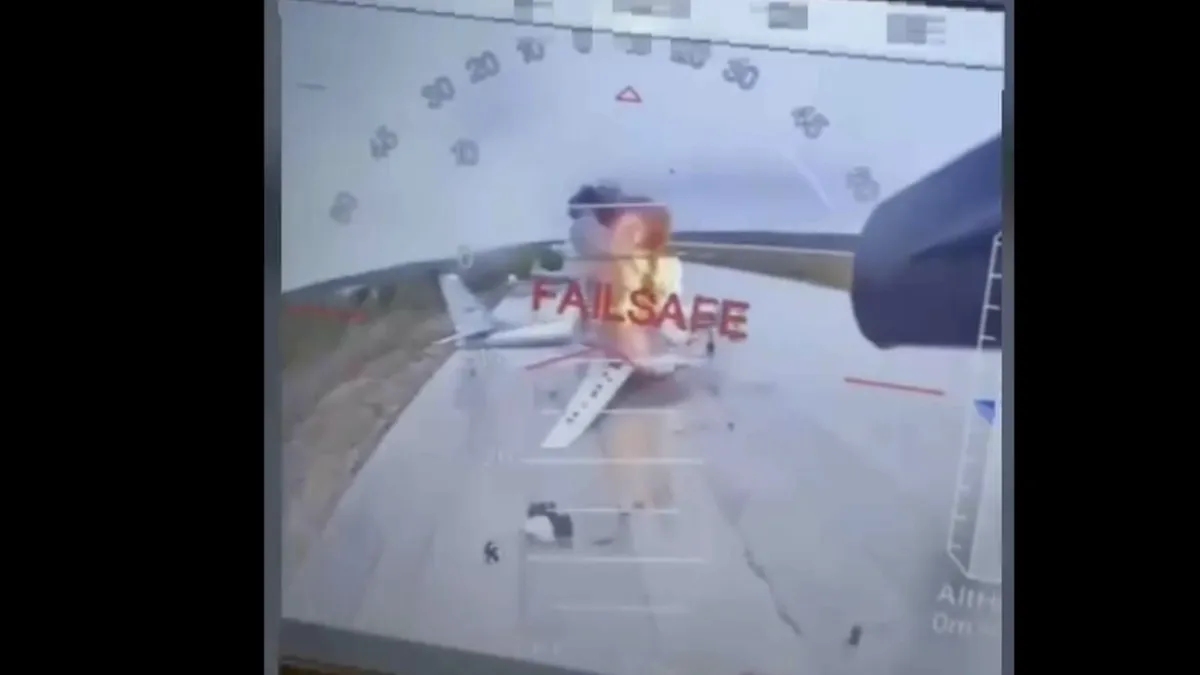
In a significant escalation of the ongoing conflict, Ukraine executed a series of drone strikes targeting military air bases deep within Russia on Sunday. This meticulously planned operation was strategically timed to coincide with a new round of Russian-Ukrainian ceasefire talks scheduled for Monday in Istanbul. After enduring more than three years of Russia's large-scale invasion, the operation, known as Operation Trojan Trucks, garnered widespread acclaim among Ukrainians on social media.
The Ukrainian Security Service successfully smuggled first-person view drones equipped with explosives onto trucks that traveled deep into Russian territory. The operation was hailed by Ukrainian officials as a crucial victory. Vasyl Malyuk, head of Ukraine's security services, stated, "The enemy has been bombing our country almost every night from these aircraft, and today they actually felt that retaliation is inevitable."
These drones were strategically launched from trucks positioned along highways near Russian military installations, striking a total of 41 heavy bomber jets at bases located as far as Murmansk in the Arctic north and Irkutsk in Siberia—over 2,700 miles from the Ukrainian border. Malyuk revealed that the drones were concealed beneath the roofs of wooden cabins on the trucks, which were opened remotely during the operation.
In an earlier statement regarding the operation, officially dubbed Spiderweb, Ukraine's security service claimed to have destroyed approximately $7 billion worth of Russia's strategic aviation assets, which represents about one-third of Russia's strategic cruise missile carriers. The operation's success was also echoed by Ukrainian President Volodymyr Zelenskyy, who emphasized that the operation had been in the works for over a year and a half, conducted under the radar of Russia's security services.
While Russian officials acknowledged the attacks on military bases, they downplayed their significance, asserting that only a few pieces of aviation technology had caught fire. They claimed to have thwarted additional attacks on three other bases and made several arrests, though details remained sparse. No injuries were reported from the drone strikes, and independent verification of the damage claims from both sides remains unattainable.
In addition to the drone strikes, the weekend witnessed further violence as a bridge collapsed on a passenger train in Russia's Bryansk region, resulting in at least seven fatalities and over 104 injuries. Disturbing images on social media depicted passengers attempting to escape from damaged train compartments in darkness. A separate rail bridge also collapsed in the Kursk region, derailing a freight train and injuring several crew members. The Russian Investigative Committee has launched a criminal investigation into both incidents, initially suggesting they may be linked to planted explosives, although this claim has since been moderated.
Despite the lack of evidence, several prominent Russian politicians quickly attributed the incidents to Ukraine, suggesting it justified continued military action. Andrei Klishas, a senior member of Russia's Federation Council, stated, "Our answer will be a buffer zone so large that it prevents the penetration of terrorists onto our territory in the future."
In response to the drone strikes, Russia launched over 470 drones and several missiles targeting various locations across Ukraine, marking the largest single-day air assault since the onset of the war. One of the deadliest incidents involved a missile strike on a Ukrainian military training unit, resulting in the deaths of a dozen soldiers and injuring more than 60 others. Although Ukraine's military seldom confirms its losses, President Zelenskyy mentioned that the attack took place in the central Dnipropetrovsk region.
Following the attack, Major General Mykhailo Drapatyi, commander of Ukraine's armed forces, resigned out of a personal sense of responsibility for the casualties, emphasizing the need for accountability within the military ranks.
As both sides prepare for the upcoming negotiations in Istanbul, they are expected to discuss memoranda outlining terms for a prospective peace agreement. President Zelenskyy highlighted his priorities for the talks, which include a full and unconditional ceasefire, the release of prisoners, and the return of abducted children. Additionally, former President Donald Trump has been vocal in advocating for direct negotiations, suggesting that the outcome of these talks will significantly influence U.S. engagement in the Ukraine conflict.
Despite the ongoing hostilities, the surprise drone operation by Ukraine has altered the dynamics of the negotiations. Moscow-based analyst Georgi Bovt noted that the Ukrainian delegation is approaching the talks not as the 'losing side of the war,' indicating a shift in the balance of power. This development underscores the complexity of the ongoing conflict and the potential implications for future diplomatic efforts.